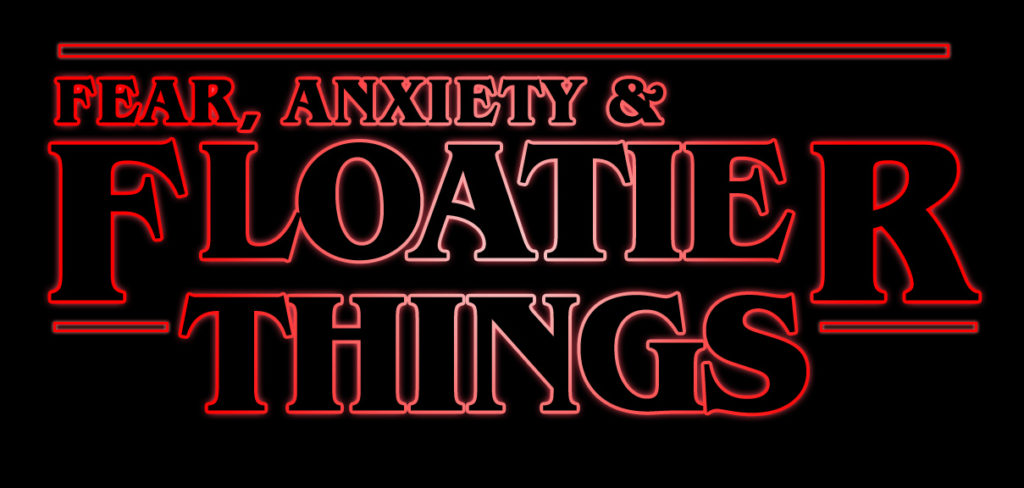Fear, Anxiety & Floatier Things
October is typically a month of focus on scary things in our culture. Things that go bump in the night. Things that trigger our fears. Fears of mysterious threats in the dark, in particular.
So that’s what we’re focusing on too throughout the month of October. Fear, anxiety and things that go bump in the float.

Here’s a reality we don’t talk about very much: the majority of people are afraid of float tanks. And by “majority”, we’re guesstimating 50%+. So … most.
What is it that scares some people about floating? About floating in a saltwater solution in the dark?
Certainly, we have some good evolutionary reasons for being wary of the dark. Thousands of years of being picked off by predatory creatures that emerge from the shadows will do that to our mammalian brains.
And fear of the deep is also well-programmed into our brains. Even though the solution in a float tank is only 11 inches deep, when you’re floating in the dark on 1,000 pounds of Epsom salts, we lose that sense altogether. At that point, we may as well be floating on the surface of an entire ocean. At night. And what’s in that ocean? What lurks beneath, waiting to devour us from below? Our brains have spent a long time becoming wired in preparation for that threat. Our skin even prunes to enable greater traction on rocky surfaces that will help us rapidly escape the water in the event of attack from below (according to one theory of pruning, at least).
But there’s a more emotional component to it than that. We conquered the power of flame and enjoyed warding off the creatures of the night with roaring fires for thousands of years too. And we generally stay out of the water now, having conquered it with boats. So we can only blame wolves in the shadows and monsters from the deep for so long.
Why is it that floating in the dark, alone with nothing but our thoughts, is more terrifying for many people than even the scariest horror movie? One study, conducted by Science Magazine, found that a lot of people would literally rather experience electric shock than be left alone with nothing to do.
Anybody who floats regularly will quickly tell you that floating is simply one of the most relaxing and happiness-inducing experiences imaginable. And yet this fear of floating among people who have not yet tried it persists.
It doesn’t help, of course, that pretty much every single reference to floating in major media portrays floating in a sinister light. The original offender, Altered States, in 1980 convinced us that float tanks would make us lose our minds, experience LSD-style hallucinations, and eventually turn into a primordial ooze. Minority Report suggested that the only applicable use for float tanks was for enslaved psychics to remote-view grisly murders. The Simpsons continued the conflation between floating and psychedelia with a trippy experience that Homer goes on in a float tank. Joe Rogan would later double down on that false association with constant discussion of powerful psychedelic experiences and floating in the same breath (we can’t tell you how many Rogan fans we’ve had to disappoint and re-educate on the comparatively much less psychologically interesting benefits that floatation therapy offers). When floating appeared on Fringe, it was couched as “ripping open consciousness”, with the main character being warned that she “might not come back” as the creaky metal hatch is closed on her. Later, Stranger Things would famously show a float tank – or at least a kiddie pool full of cold salt water – invoking inter-dimensonal travel and experiences of “Demogorgons”.
None of that is at all true, of course. People have beautiful, transcendent experiences. And certainly some difficult emotional stuff can arise to be dealt with (this is what makes it such an effective tool for managing PTSD). Rarely, though, is there a Demogorgon.
Between evolutionary fear of the dark, a psychoemotional resistance to being alone with our thoughts, and a constant barrage of wildly inaccurate and melodramatic media representations of sensory deprivation, it’s really no mystery why so many people feel so intimidated by it.
Throughout October, we’ll be breaking down some of those fears, explaining how floating is safe and fun, examining the mental nature of fear, and sharing how everyday people have used floating to conquer their own fears and anxieties.
So follow along with us for a month of Fear, Anxiety and Floatier Things as you enjoy your Halloween season.
Follow us on Facebook for the latest updates throughout the month.

